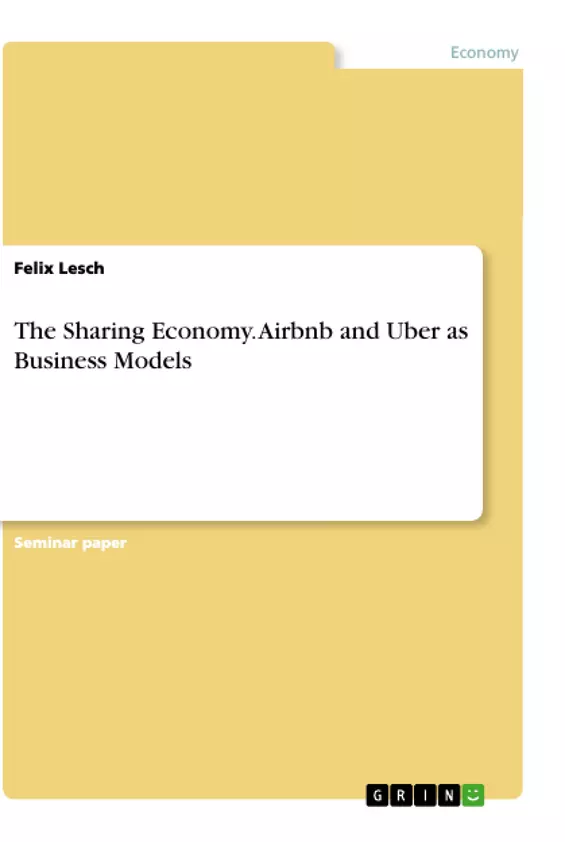The thesis aims to answer the question of whether the sharing economy benefits society and who benefits most from it.
At the beginning, the term sharing economy is defined and the motives for participating in the sharing economy are analyzed. Then, the concept of the sharing economy is explained in more detail using the example of the technology companies Uber and Airbnb. Their business models and the controversies and scandals that surround both companies are presented.
The Greek philosopher Heraclitus already knew 2500 years ago that the only constant in life is change. In a dynamic world that is oriented towards the free market economy, established companies regularly disappear or face new competition from innovative business models that meet the changing needs of consumers. Values and morals change, and people relocate. Nevertheless, it is guaranteed that there will always be providers who keep pace with the times and can react to current trends. One of these current trends is the sharing economy.
Inhaltsverzeichnis (Table of Contents)
- Introduction
- Problem definition
- Objectives and structure of the work
- The Sharing Economy
- Definition
- Motives and Intensity of Use
- Uber
- Business Model
- History
- Uber Eats
- Controversies
- Airbnb
- Business Model
- History
- Controversies and Issues
- Goals
- Conclusion
- Achievement of objectives
- Outlook/Perspectives
Zielsetzung und Themenschwerpunkte (Objectives and Key Themes)
This paper aims to explore the concept of the Sharing Economy and its impact on society. It seeks to understand the motivations behind participation in the Sharing Economy and the potential benefits and drawbacks it presents.
- Definition and characteristics of the Sharing Economy
- Motives and factors driving participation in the Sharing Economy
- Business models and practices of prominent Sharing Economy companies, such as Uber and Airbnb
- Controversies and ethical considerations surrounding the Sharing Economy
- Potential societal implications of the Sharing Economy
Zusammenfassung der Kapitel (Chapter Summaries)
The paper begins by introducing the concept of the Sharing Economy and establishing the need for its distinct classification, highlighting its widespread impact on individuals. The introduction also defines the problem of examining the potential benefits and disadvantages of the Sharing Economy for society.
Chapter 2 provides a comprehensive definition of the Sharing Economy, exploring the motives and intensity of use among individuals. This chapter lays the groundwork for the subsequent analysis of specific Sharing Economy companies.
Chapter 3 delves into the business model, history, and controversies surrounding Uber, a leading company in the transportation sector of the Sharing Economy. It also discusses Uber Eats, a subsidiary focused on food delivery, and explores the challenges and concerns surrounding the company’s operations.
Chapter 4 focuses on Airbnb, a prominent player in the accommodation sector of the Sharing Economy. It examines Airbnb’s business model, history, and the various controversies and issues associated with its platform. The chapter also considers Airbnb’s stated goals and their implications.
Schlüsselwörter (Keywords)
This paper focuses on the Sharing Economy, exploring key concepts such as peer-to-peer sharing, collaborative consumption, business models, platform companies, Uber, Airbnb, controversies, ethical considerations, and societal impact.
- Quote paper
- Felix Lesch (Author), 2020, The Sharing Economy. Airbnb and Uber as Business Models, Munich, GRIN Verlag, https://www.grin.com/document/1011812



